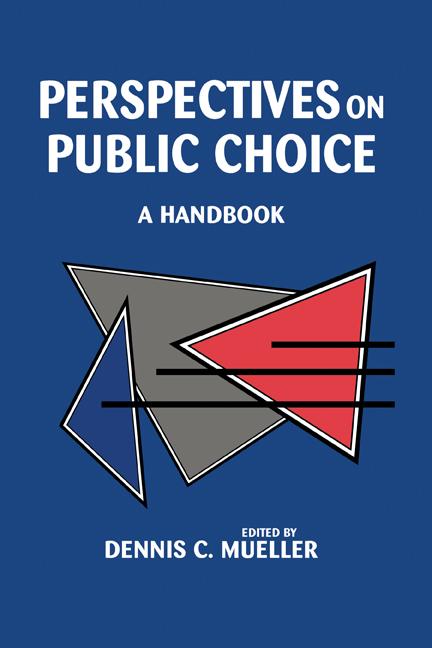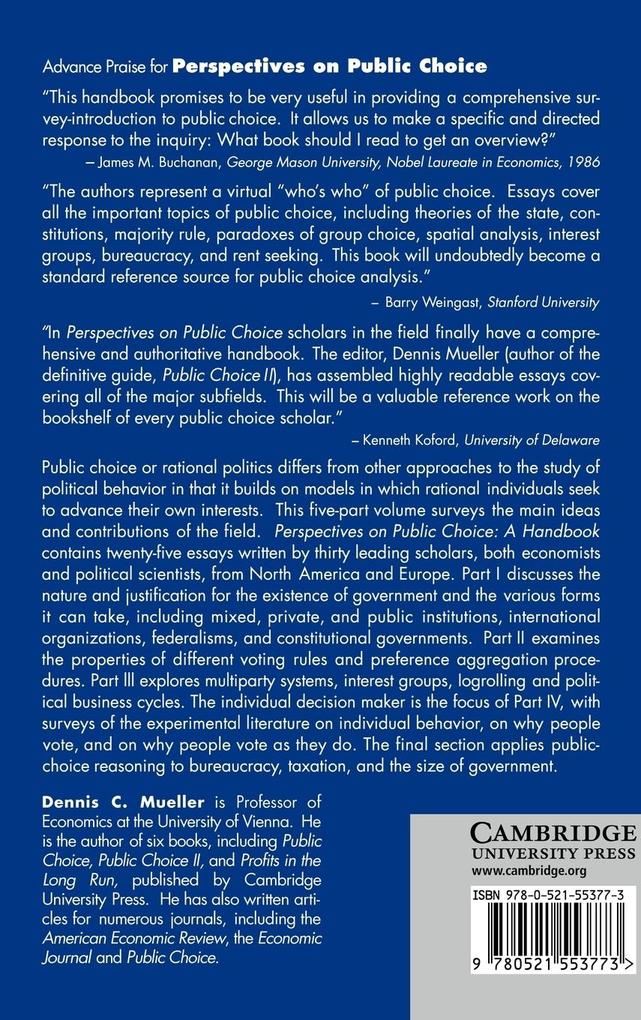
Zustellung: Do, 19.06. - Di, 24.06.
Versand in 1-2 Wochen
VersandkostenfreiBestellen & in Filiale abholen:
This five-part volume surveys the main ideas and contributions to the field of public choice.
Inhaltsverzeichnis
1. Public choice in perspective Dennis C. Mueller; Part I. The Need for and Forms of Cooperation: 2. Economic theories of the state Russell Hardin; 3. Neither markets nor states: linking transformation processes in collective-action arenas Elinor Ostrom and James Walker; 4. The political economy of Federalism Robert P. Inman and Daniel L. Rubinfeld; 5. The public choice of international organizations Bruno S. Frey; 6. Constitutional public choice Dennis C. Mueller; Part II. Voting Rules and Preference Aggregation: 7. Cycling and majority rule James M. Enelow; 8. Majority rule Douglas W. Rae and Eric Schickler; 9. Group choice and individual judgments H. Peyton Young; 10. Some paradoxes of preference aggregation Prasanta K. Pattanaik; 11. Voting and the revelation of preferences for public activities T. Nicolaus Tideman; Part III. Electoral Politics: 12. The spatial analysis of elections and committees: four decades of research Peter C. Ordeshook; 13. Multiparty electoral politics Norman Schofield; 14. Interest groups: money, information and influence David Austen Smith; 15. Logrolling Thomas Stratmann; 16. Political business cycles Martin Paldam; Part IV. Individual Behavior and Collective Action: 17. When is it rational to vote? John H. Aldrich; 18. Voting behavior Morris P. Fiorina; 19. Public Choice Experiments Elizabeth Hoffman; Part V. Public Choice in Action: 20. Modern bureaucratic theory Ronald Wintrobe; 21. The positive theory of public bureaucracy Terry Moe; 22. The political economy of taxation Walter Hettich and Stanley L. Winer; 23. Rent seeking Robert D. Tollison; 24. Endogenous protection: a survey Stephen P. Magee; 25. Why does government's share of national income grow? An assessment of the recent literature on the US experience Cheryl M. Holsey and Thomas Borchering.
Produktdetails
Erscheinungsdatum
31. Dezember 2009
Sprache
englisch
Seitenanzahl
692
Autor/Autorin
Dennis C. Mueller
Herausgegeben von
Dennis C. Mueller
Verlag/Hersteller
Produktart
gebunden
Gewicht
1257 g
Größe (L/B/H)
235/157/45 mm
ISBN
9780521553773
Entdecken Sie mehr
Bewertungen
0 Bewertungen
Es wurden noch keine Bewertungen abgegeben. Schreiben Sie die erste Bewertung zu "Perspectives on Public Choice" und helfen Sie damit anderen bei der Kaufentscheidung.










